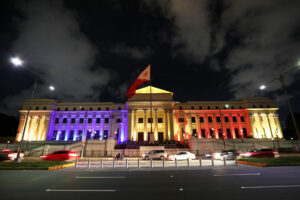The honeymoon period

THE first hundred days of a new administration are used as an indicator of its policy priorities, style of decision-making, and political value system. This “honeymoon period” is characterized by some measure of goodwill extended to the new leadership, even by traditional media (not the social one) which still have little basis for criticism — The economic team looks experienced, even with hair dye.
Media (though not all) can get into an adversarial stance, maybe by day 10. Critics can also jump into the fray by then. Political friends and supporters (including old, recent, and two-hours old) caught in the euphoria of change are not yet squabbling over what they feel are betrayed promises. Watch out for the new coalitions of critics from former cheerleaders, especially those expecting to be appointed but who end up disappointed.
The 100-day period establishes the new brand of leadership. Shall the country’s brand continue to be a political story in the international media, or an economic one? Can the new administration relaunch a new brand for the country?
To be avoided are “unforced errors.” In basketball, which is our metaphor for life, this term refers to infractions that could be avoided like too leisurely bringing down the ball from full court and incurring the eight-second violation to cross half-court. Other examples are stepping on the line and 24-second violation without having taken a shot.
Such issues include sisterly comments (we don’t mind media personalities migrating) or attempts to change the names of highways or airports or thinking of commemorative holidays for the upcoming 50th anniversary of you-know-what in September.
After the contest where all issues are divisive and political, the new administration can re-frame its advocacy as an economic one as it has already started to do in its slogans of recovery and coming back to prosperity. One can include climate change and food security just for variety.
Restating the new administration’s goal as the pursuit of efficiency, consistency, and a simplification of the rules sharpens the business message and focuses effort and resources in the right direction.
There are possible low-hanging fruits to start with.
The economic team has already been announced. This sent a strong message to media when priority was given to designating the Secretaries for Finance, Trade and Industry, NEDA, and Tourism. The first headlines were on the economic team. Note that we include tourism here since this defines the new brand too in the international scene.
Using the economy as a theme for the first few speeches includes improving government focus on ease of doing business with digitalization and greater transparency. In selecting speaking engagements, some emphasis needs to be given to business groups most likely to move forward with the economic theme.
Selecting spokespersons that are economically literate helps. The spokesperson or other media-facing personalities should be able to discuss with ease the economy and the improving business sentiment regarding government, especially with foreign investors. An economically savvy communicator will be comfortable with explaining GDP growth, inflation, and reduction of foreign debt.
Ceremonial events should focus on the economy. Inaugurations of plants, especially large ones with a high component of employment potential present photo opportunities for the overarching theme that the country is open for business.
Surely, it is naive to suppose that the honeymoon period can stick to a purely economic narrative. (Even in real honeymoons, it’s not all about… the scenery.) For so long, the country has been a symbol of missed opportunities because of political baggage. There needs to be a concerted effort to stick to an economic story.
A political narrative will persist for sure. There are still unsolved issues like the framing of a legislator needing to be freed from incarceration, or the issue of the freedom of the press with the abrupt non-renewal of a franchise. There are too the persistent statistical arguments on the election results. Some quarters are still fighting that battle.
But has the honeymoon period already started with the end of the canvassing? Then the messaging needs to be launched earlier.
The first 100 days are a narrow window where hope and the feeling of immense possibilities intersect. Love of country should be about believing that economic prosperity is part of our future… and that requires moving forward together.
Tony Samson is chairman and CEO of TOUCH xda




